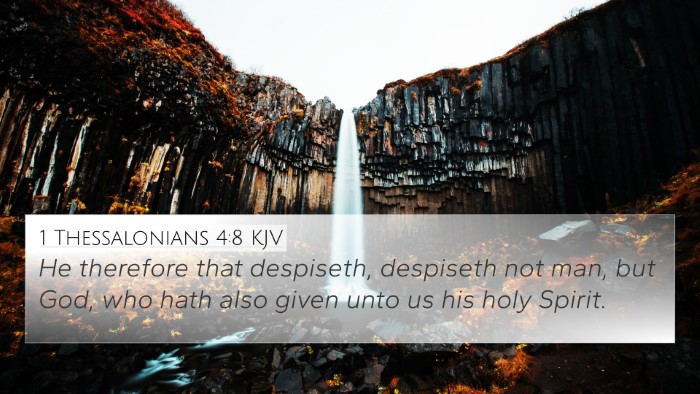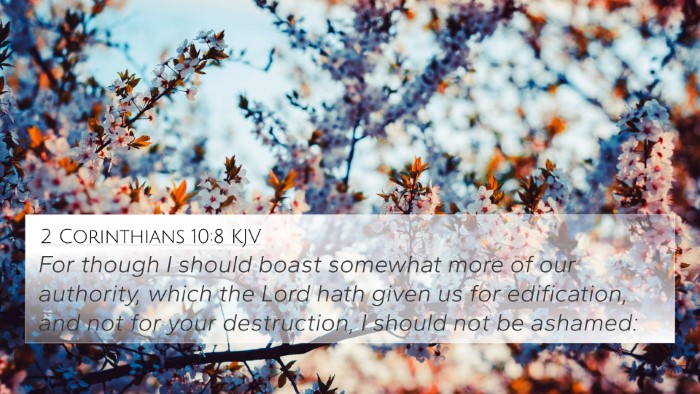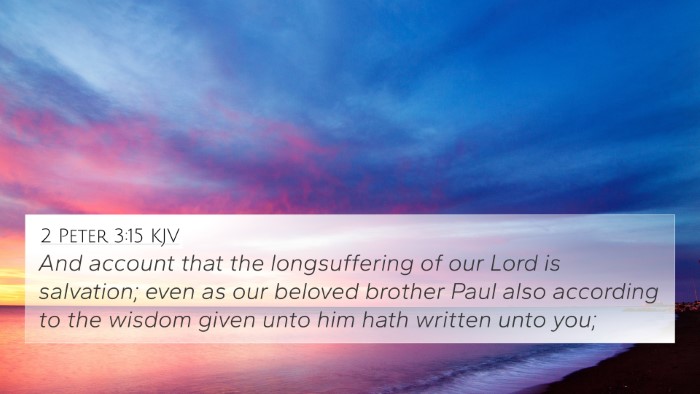Understanding 1 Corinthians 7:40
1 Corinthians 7:40 states: "But she is happier if she remains as she is, according to my judgment; and I think that I also have the Spirit of God." This verse encapsulates the apostle Paul’s views on marriage and singleness, particularly concerning widows. Through this verse, Paul affirms the state of being single and provides guidance on how it might be a preferable condition in certain circumstances.
Meaning and Interpretation:
-
Matthew Henry's Commentary:
Matthew Henry emphasizes the happiness that can come from remaining unmarried, especially for widows. He notes that Paul expresses a preference for this state, attributing much joy to those who can dedicate themselves fully to God without the distractions of marital duties.
-
Albert Barnes' Commentary:
Albert Barnes points out that Paul’s assertion reflects a wisdom rooted in divine guidance. Barnes highlights that Paul believes he has the Spirit of God in asserting this preference. His perspective suggests a view that prioritizes spiritual commitment over marital obligations, arguing for the value of remaining single to better serve God.
-
Adam Clarke's Commentary:
Adam Clarke further explains that Paul’s judgment is based on his understanding of circumstances and the pressures of the times. He acknowledges the social and spiritual advantages of unmarred devotion, stressing that in a moment of crisis or distress (as the early church faced), singleness can indeed be a blessed state.
Connections to Other Bible Verses
The insights in 1 Corinthians 7:40 can be linked to several other biblical texts, which provide a broader understanding of the themes of marriage, singleness, and spiritual dedication. Here are some relevant cross-references:
-
1 Corinthians 7:8-9: Paul highlights the value of remaining single, advising the unmarried to stay as they are to avoid the difficulties of marriage.
-
Matthew 19:10-12: Jesus discusses the implications of remaining single for the sake of the kingdom of heaven, affirming that not everyone accepts this standard.
-
1 Timothy 5:14: Paul advises younger widows to marry and bear children, acknowledging a different principle that may apply to others in distinct situations.
-
Luke 20:34-36: Jesus teaches about the resurrection state of individuals who are no longer given to marriage, reinforcing the idea that earthly marital commitments do not transcend spiritual realities.
-
Romans 7:1-3: Paul discusses the law and marriage, establishing that death frees one from marriage obligations, highlighting the commitment to God that remains post-marriage.
-
Revelation 14:4: This verse refers to those who remain unblemished and singularly devoted to God, showing the spiritual merit of a life wholly committed to the Divine.
-
Philippians 4:11-13: Paul expresses contentment in all states, which aligns with the call to embrace whatever circumstances are provided by God, be it singleness or marriage.
Thematic Bible Verse Connections
The connections revealed in 1 Corinthians 7:40 inspire considerations about personal commitment to God over societal norms or expectations related to marriage. These themes encourage deeper study into the role of divine guidance in personal decisions regarding relationships.
How to Use Bible Cross-References
To explore the themes of 1 Corinthians 7:40 and its cross-references, effective tools for Bible cross-referencing can be consulted, such as:
- Bible Concordance: A tool to find occurrences of words and themes across the scriptures.
- Bible Cross-Reference Guide: These guides help link various passages that share concepts or teachings.
- Cross-Reference Bible Study: An approach to systematically explore related verses to broaden understanding.
- Bible Reference Resources: Including commentaries or study Bibles that provide insights into biblical connections.
Conclusion
In summary, 1 Corinthians 7:40 serves as a profound reminder of the value of singlehood within a Christian context and encourages believers to seek divine wisdom in their personal life decisions. Its connections to various scriptures allow for a rich exploration of commitment, service, and the nature of ministry in both married and single states.
These insights not only enhance the understanding of the verse itself but also provide a framework for interpreting and applying various biblical teachings in one’s life. The thematic connections gleaned through cross-referencing enrich one’s study and comprehension of the gospel message.













